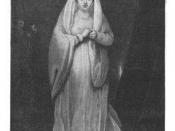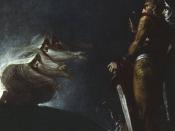Macbeth An individual that is evil is characterized as being a person who has a malicious disposition and thoughts. The power of evil is strongly evident throughout William Shakespeare's Macbeth. It is established through Macbeth's desires to kill Duncan, Macbeth's intentions to kill Banquo and Lady Macbeth's influences to persuade Macbeth to kill Duncan.
An example that demonstrates how strong the power of evil can be Macbeth's desires to kill Duncan, the king of Scotland.
1"My thought, whose murder yet is but fantastical, shakes so my single state of man that function is smother'd in surmise, and nothing but what is not"(Act I, iii,139-142) This quote is from Macbeth's thoughts of obtaining Duncan's throne to become king. Eventhough Macbeth has not really taken his consideration into action, we are still under the assumption that Macbeth could act on his thoughts and commit this unlawful murder. Knowing that his thoughts are deliberate, it is definitely considered as being an evil characteristic.
Macbeth's intentions to kill Banquo, a fellow leader of Duncan's Scottish Army, is a second example that proves evils powers.
2"Bring them before us, to be thus is nothing but to be safely thus our fears in Banquo stick and in his royalty of nature reigns that which would be fear'd tis much he dares"(Act 3, I, 47-52) Macbeth decides to take Banquo's life because, he has a slight idea of the true nature and identity of Macbeth. Banquo knows that Macbeth was behind the murder of Duncan. What Banquo does not know is that Macbeth knew of Banquo's observations and inquiries, so before Banquo has a chance to blow Macbeth's cover, he is killed. Murder of a fellow soldier is a sign of disrespect and an evil act.
The strength of evil is evident in Lady Macbeth's dirty influences on Macbeth's decision to kill Duncan.
3"And, to be more than what you were you would be so much more the man. Nor time nor place did then adhere, and yet you would make both they have made themselves, and that their fitness now"(Act I, vii,50-54) Lady Macbeth has a strong influence on what Macbeth decides what to do. As they are life time partners, Macbeth would have no choice but to listen to his loyal wife's opinions and suggestions. This quote has Lady Macbeth asking her husband if he is frightened to be in fact what he wanted to be. Meaning that she is trying to say that Macbeth is scared to become what he has always wanted to be, King. Deception is categorized as being evil. Lady Macbeth is obviously looking at the fact that if Macbeth is a pointed king, she would automatically become First lady. She is looking at the benefits not only for Macbeth, but also for herself.
Macbeth's desires to kill Duncan, his intentions to kill Banquo and Lady Macbeth's influences over her husband to kill Duncan are all evil. These three factors affected the power of evil in Macbeth causing it to grow. Explaining these examples, the power of evil is strongly evident throughout William Shakespeare's Macbeth. Evil is a characteristic that some people have, or attain throughout living their life. Not everyone has this quality, and at the same time, no one should want this quality. Using Shakespeare's Macbeth as an example, evil never succeeds, good always conquers.





